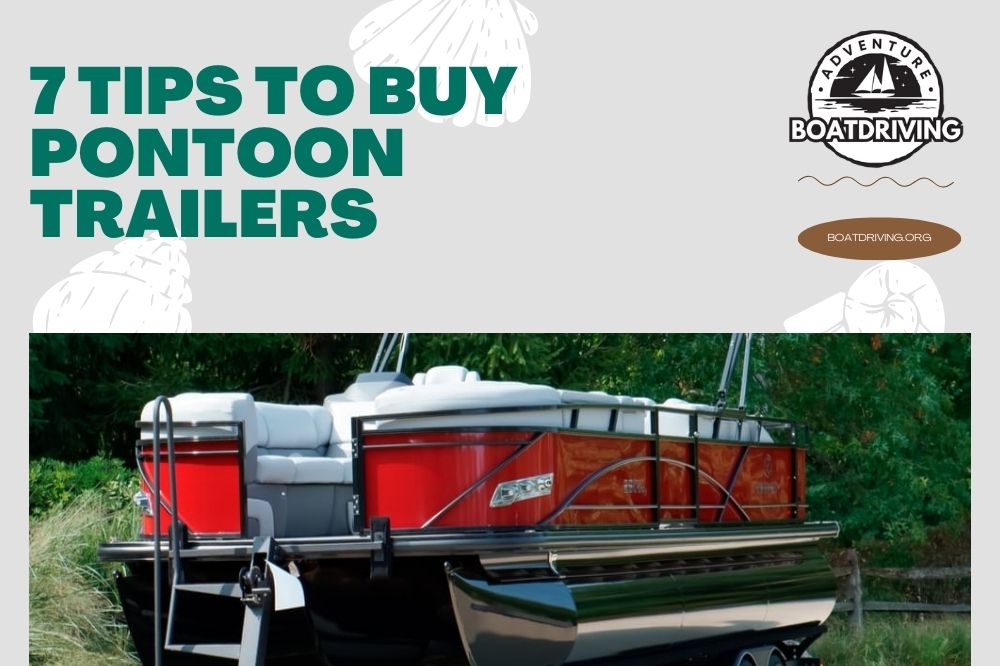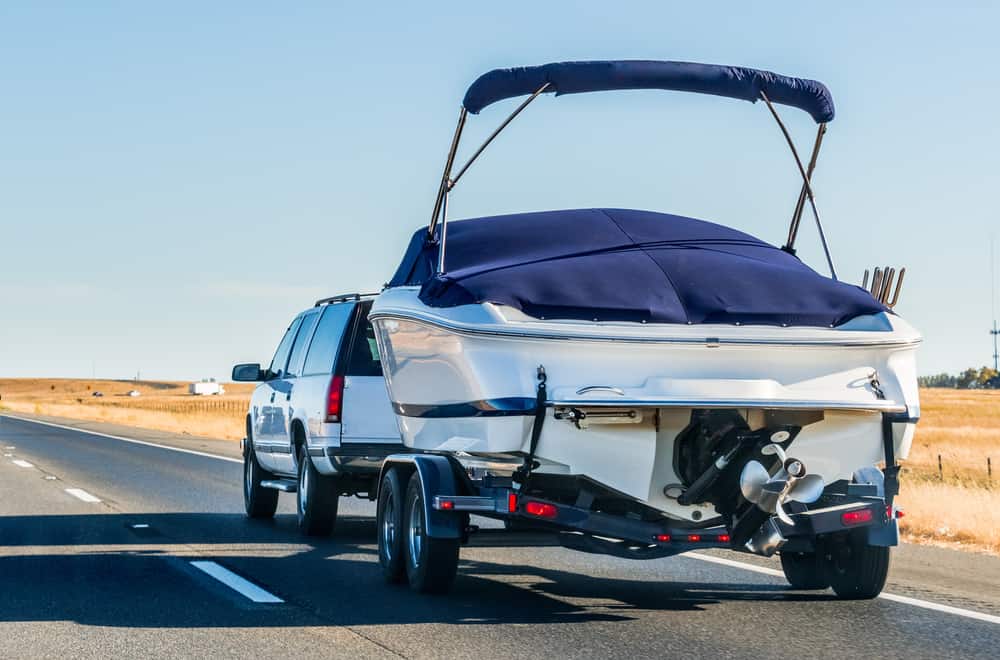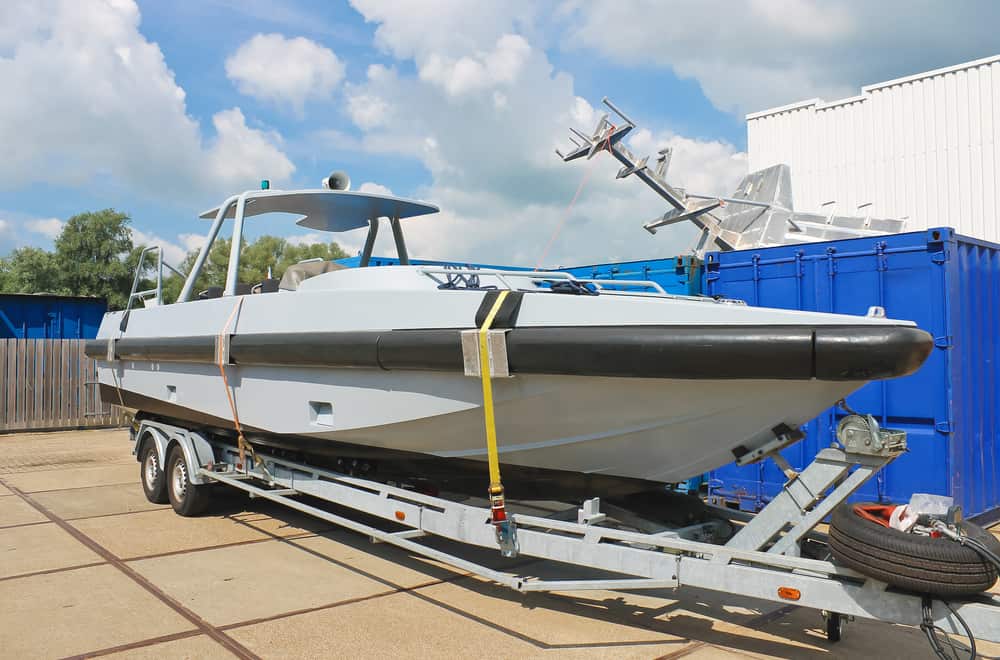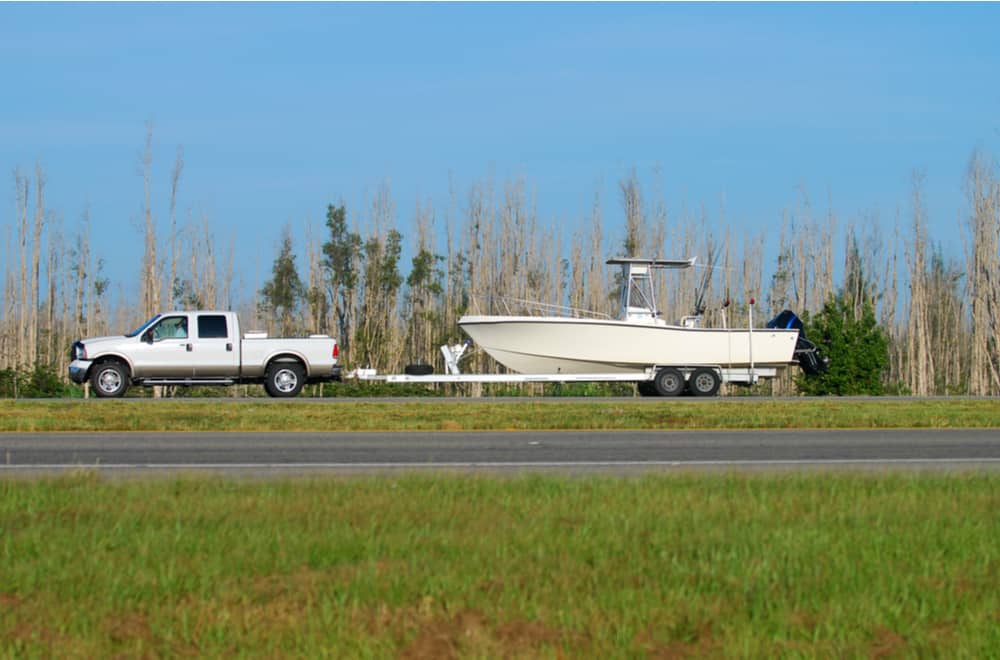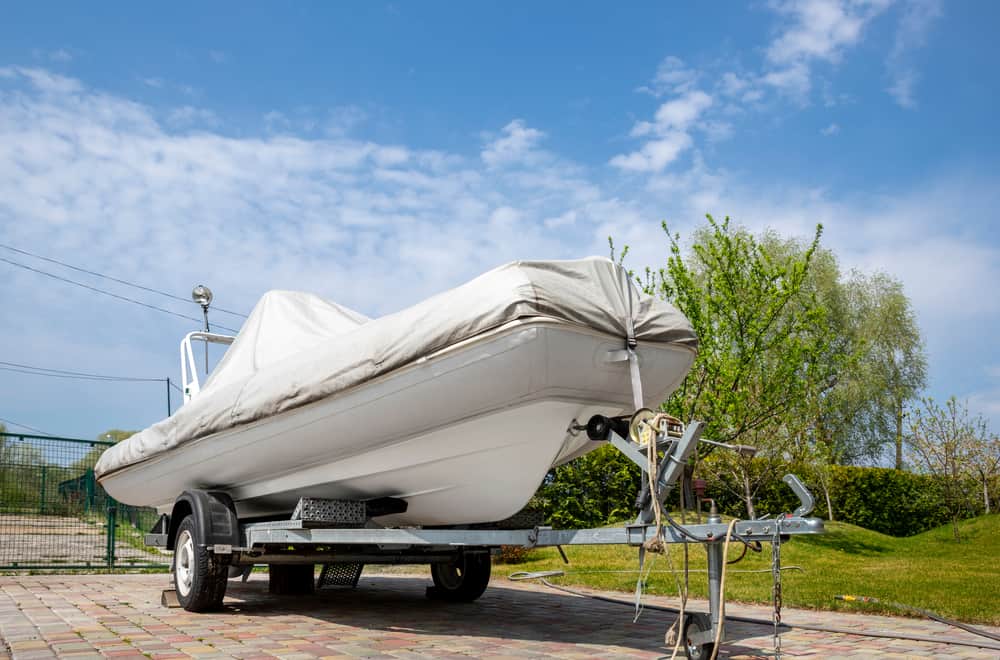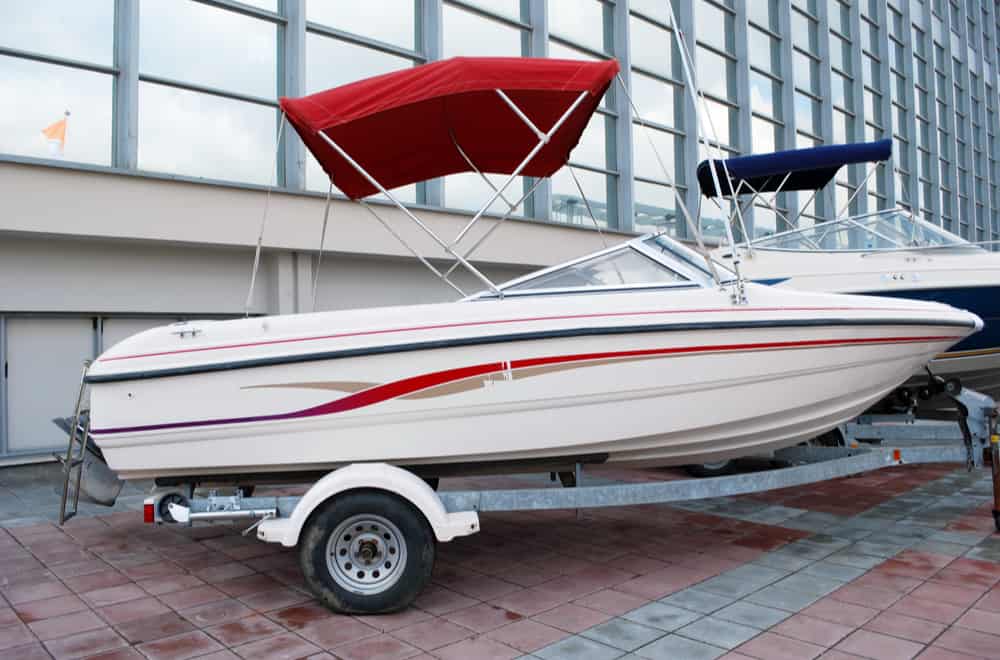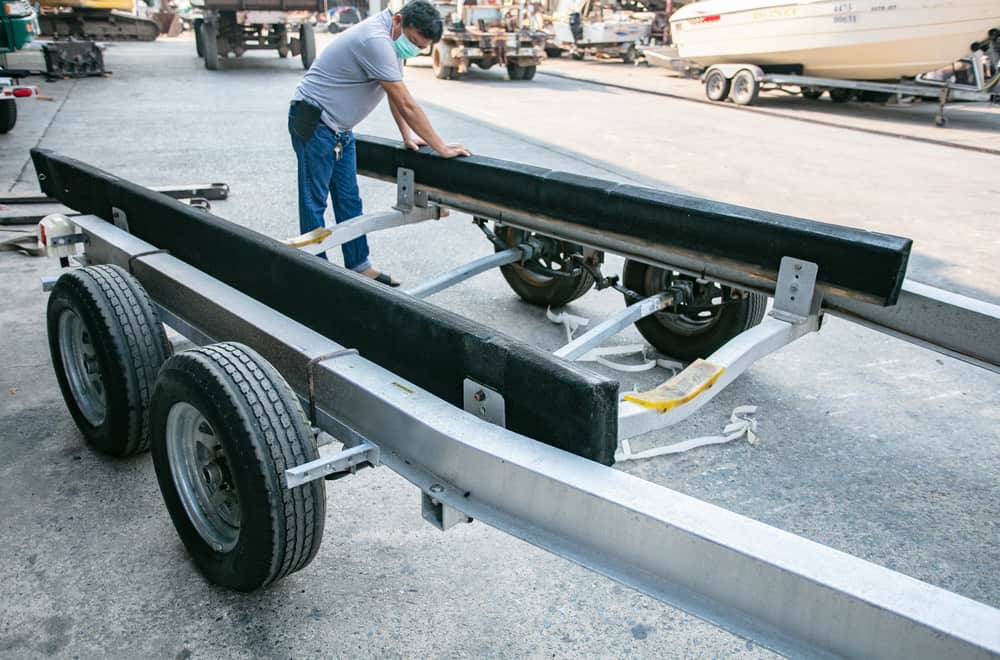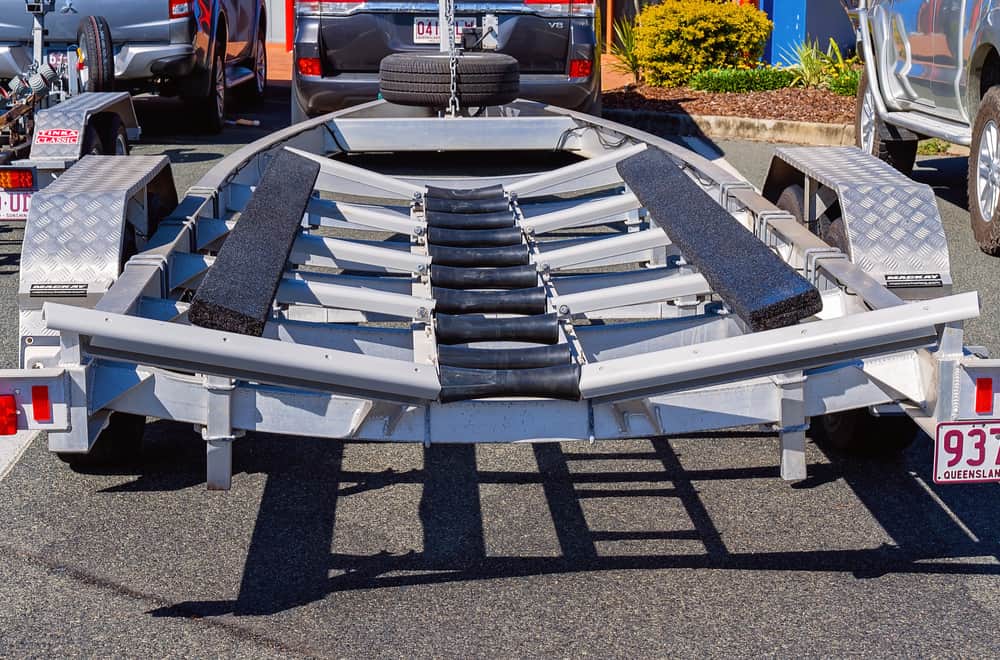Are you in the market for a trailer for your swanky pontoon?
A good, handy trailer takes your boating experience to the next level. You can set out on long drives to explore new waters without fretting about transporting your boat.
In this guide, I will explain everything you need to know when you want to buy pontoon trailers. There are several things to consider; I have broken down the article into the most important features to pay attention to when buying a trailer for a pontoon boat.
Let’s get started!
How to buy a pontoon boat trailer?
1. Boat weight
The first thing to find out when buying a pontoon trailer is the weight of your boat. You want to buy a trailer that can safely accommodate your boat’s gross weight.
Each trailer has a specific carrying capacity, a measure of how much the trailer can support. You will find this figure, known as the Gross Vehicle Weight Rating, on the trailer’s VIN tag.
The boat’s gross weight refers to the boat’s dry weight, engine weight, and fully-filled gas tank. The Gross Vehicle Weight Rating (GVWR) includes the trailer’s weight plus the boat’s weight.
The trailer’s carrying capacity is the GVWR minus the trailer’s weight. If you don’t know your boat’s gross weight, you can find out from the manufacturer.
In addition, you should also consider your vehicle’s capacity to tow the trailer with the pontoon boat on top. Just like you shouldn’t exceed the trailer’s capacity, you should also not exceed your vehicle’s towing capacity.
Find out from the manufacturer about the vehicle’s GVWR and tongue weight. The tongue weight is the downward force exerted at the point where the trailer is coupled to the towing vehicle. This weight should be 10-15% of the trailer’s gross weight.
Preferably, opt for trailers with adjustable axles. This helps take the excess weight off the tongue, preventing potentially dangerous problems such as loosing traction on the vehicle’s rear wheels.
2. Axles
Axles give the trailer mobility. There are three types of pontoon trailer axle systems: single, multiple, and tandem.
- Single axle
Single axle trailers have just two wheels. They are more affordable than multi-axle trailers and are comparably low maintenance as there are only two tires and fewer parts to look after.
Single axle trailers maneuver tight corners easily and are less cumbersome to handle, for example, when moving the boat in and out of a storage facility.
Single axle trailers are, however, best suited for short-haul trips. The two wheels may not handle the wear and tear of long-distance trips.
- Multiple Axle
Multiple axle trailers have several sets of wheels. They are the safest option for long hauling as they provide greater stability, can withstand wear and tear on longer journeys, and are more reliable in case of damage to one tire.
- Tandem Axle
Tandem axle trailers have two sets of axles. This type of trailer is a good compromise between a single and multiple axle trailer. They offer the dexterity of a single axle and stability of a multiple axle trailer.
If you are looking for a pontoon trailer that provides a good level of safety, stability, and ease of use, a tandem axle is a good choice.
3. Suspensions
Suspensions ensure a smooth ride, keeping the boat trailer from rattling, shaking, and bouncing, which can easily throw the pontoon boat off balance.
There are two types of suspensions for pontoon trailers: Torsion and spring. Both do a good job of keeping the trailer riding smoothly and with stability.
- Torsion suspension
Torsion suspensions are made of rubber wires placed inside the axles tube. The rubber wires compress as each wheel turns, ensuring the trailer runs smoothly even on potholes.
The cords enable the wheels to absorb the shocks from the road underneath, allowing a smoother ride. Torsion axels have few moving parts, leading to a less bumpy ride. This also means the system requires less maintenance.
Torsion suspensions have a longer life span because the axle tube is coated in zinc, and there is no interaction with other surrounding metals, which would otherwise lead to fast wear and tear.
On the downside, torsion suspension systems are costlier than their spring counterparts. You might need to pay more to replace or repair despite the system having fewer parts.
- Spring suspension
Spring suspension systems are popular as they are more affordable. Spring is best for use in multi-axle trailers. They facilitate the even distribution of impact across multiple wheels, lessening the impact and enabling a smoother ride.
If you keep your trailer in storage for long periods on an uneven surface, consider spring suspension trailers. Each wheel has its own springs in these trailers, supporting the trailer for a long time without giving in.
The biggest disadvantage of a spring suspension system is that it can wear out faster. The system is cheaper to buy, but you might find yourself spending more on frequent repairs.
Also, although there is even distribution of impact, worn-out springs can make for a bouncy ride, especially on rough roads.
4. Brakes
Whether you should buy a pontoon trailer with brakes will depend on the laws in your state. In some states, trailers are required to have brakes on all axles, while in others, brakes are only necessary for one wheel or are not needed.
The GVWR of the trailer will also determine whether your trailer should have breaks. State laws stipulate the minimum GVRW that necessitates the breaks in the trailer’s axle.
Generally, single axle trailers can be operated safely without brakes. Multiple and tandem axle trailers need brakes in at least one axle.
Check with your local transportation and natural resources authorities to determine if you need brakes in your trailer and whether there are specific types you need, i.e., hydraulic or electric.
All in all, you should strongly consider trailers with brakes even if your state laws don’t require it. Brakes can avert potential accidents, especially if carrying a particularly heavy boat. If you are using a small tow vehicle, a braking system in the trailer could save your life!
The different types of brake systems for pontoon trailers are categorized into electric and surge brakes.
- Electric brakes
Electric brakes use a controller installed in the car’s cabin. The tow vehicle’s brake lights trigger the controller; when it breaks, it sends an electrical wave down a powerful circuit to the trailer’s brake system. The tow vehicle’s braking system powers the electric brake system, so the trailer brakes are still effective on rough roads. I recommend marine-grade brakes that can withstand water and corrosion damage.
- Surge brakes
Also known as hydraulic brakes, surge brakes are contained inside the trailer and function independently of the tow vehicle’s brake system.
Surge brakes don’t immediately activate when the tow vehicle’s brake system is activated; there is a noticeable delay. Surge brakes are easier to work with and provide a smoother ride when installed correctly and properly maintained. On the downside, you will not control the trailer from your car, for example, if the trailer is swaying.
In most states that require a braking system, it is also required that the system be controlled from inside your car, which isn’t possible with surge brakes. Check with your state laws whether this is a requirement; if it is, an electric brake system would be your best choice.
5. Aluminum vs Steel Frame
Boat trailers are made from aluminum or steel. Both frames have different cost points, and each performs differently, especially in salty waters.
Aluminum trailers are best for humid regions where the water tends to be salty. Aluminum can withstand such climates without succumbing to rust.
But, aluminum is costlier than steel. If you are only using your trailer in freshwater, you might want to consider the cost implications.
Galvanized steel trailers are more suited to freshwater regions. It can stand up to salty water but can still rust. Steel is stronger and heavier than aluminum, making the frame longer lasting.
Whether you opt for an aluminum or steel trailer, be sure to rinse the trailer and flush the braking system with fresh water after each use.
6. Tires
There are two types of boat trailer tires: radial and bias-ply.
Radial tires are the most popular. They are wider, have a more solid sidewall, and better grip, making them less susceptible to losing traction. Radial tires are best for long hauling.
Bias-ply has more flexible sidewalls and isn’t built for long-haul trailering. These tires are, however, more affordable than their radial counterparts.
7. Bunk Trailers, Rollers, Center Lift
When you want to buy a pontoon trailer, you will have to choose three different styles. These are bunk, rollers, or center lift.
- Bunk trailers
A bunk trailer has a simple design with few parts. It consists of wooden bunks in the middle of the trailer that cradle the boat. It is easier and cheaper to repair and maintain.
Bunk trailers are best suited for use in deeper waters from where you can launch or pull your boat. But, because the parts are regularly submerged in water, they are more prone to rust and corrosion in salty waters.
- Roller Trailers
Instead of bunkers, roller trailers feature several rollers, making it easier to launch and retrieve the boat.
This trailer can be used in shallow waters. The parts are not submerged in water, sheltering them from rust and corrosion.
A roller trailer is costlier to buy and maintain as it has more moving parts.
- Center lift trailers
Center lift or scissor-style trailers feature a lift at the boat’s center. The lift is connected to a winch that helps to lower and raise the boat.
Scissor-style trailers are best suited to shallow waters. The lift lowers the boat and lets it float into the water, making it easy to offload the pontoon.
But, this trailer is designed such that the toons on the boat hang out on the sides, making the vessel unstable and dangerous, especially for long hauling. Center lift styles are best for transporting pontoons over short distances.
Summary: 7 Tips to Buy Pontoon Trailers
Buying the right pontoon trailer is as important as buying the right boat. Seemingly small decisions such as whether to buy a steel or aluminum trailer can make all the difference when it comes to the longevity of your pontoon. I hope these tips will come in handy to help you buy a pontoon trailer that truly meets your needs.
